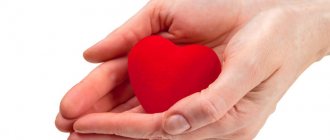If in heaven there is only talk about the sea, as the heroes of the film “Knocking on Heaven's Door” claim, then on earth there is talk only about love. You probably have to be very original not to write about this on the eve of Valentine's Day. Let's talk about love and passion! For many people, these two concepts are identical, they are periodically confused, but from the point of view of psychological health and healthy relationships, this is fraught with problems. This endless confusion occurs because often these two feelings occur in parallel.
If we now try to define “love,” we will have to publish a multi-volume book with hundreds of thousands of text, and add terabytes of video and audio materials. Therefore, let's focus on the differences between love and passion, and we will rely only on some theses.
The Ozhegov dictionary love as a strong feeling of deep affection, selfless and sincere affection. And passion
like an ardent desire.
These two conflicting definitions will help us distinguish between these feelings. Love is based on intimacy, while passion is purely on desire.
Passion is a person’s lust that is uncontrollable and has a significant impact on his thinking and behavior.
E. Fromm argued that instincts, or natural drives, are rooted in the physiological needs of a person, while human passions are rooted in his character. In other words: instincts are a response to a person’s physiological needs, while passions are a response to his existential needs.
The difference between love and passion
Passion in a relationship often becomes the dominant factor, which pushes into the background thoughts, deeds, and emotions that are not related to the object of sexual desire. Burning with an all-consuming, boundless attraction, a person constantly experiences nervous overstrain. During the period of falling in love, sensual sensations intensify.
The timbre of a voice, a fleeting glance, the aroma of perfume of the object of desire can cause an emotional outburst. Such metamorphoses often provoke a stressful state in which a person physically cannot remain for a long time. That is why frantic passion passes quite quickly. Due to strong emotional overtones, passion for a man or woman cannot last indefinitely.
This condition depletes the nervous system. A protective reaction is activated, which cools the ardor and normalizes the mechanisms of nervous regulation. In rare cases, a psychotherapist can help overcome pathological attraction. In psychology, love and passion that arise between a guy and a girl are different:
- Duration. Unlike a feeling like love, passion can last up to 3 years, which predetermines a mandatory transition to another phase of the relationship. After the passion for a woman or man has weakened, a period of love, friendship, sympathy, indifference or even rejection begins if the former lovers had a stormy breakup.
- The nature of the manifestations. Signs of passion include ardor, intense sensations, an uncontrollable desire for sexual intimacy, and a desire to constantly see a partner. Love is characterized by tenderness, warmth, empathy (the ability to empathize), calm, measured communication.
- The nature of feelings. “Animal passion” is a common expression that ideally characterizes the nature of attraction to a partner. If a man and woman are burning with passion, they spend most of their time in bed. Unbridled sex is the basis of such relationships and keeps emotions at the highest possible level. In love, the basis of relationships is mutual respect, deep sympathy, common interests, worldview and life values.
- The age of the partners. Due to the fact that passion is built on sexual attraction, this is the prerogative of young, physically active people with normal sexual function. At this age, the processes of sexual arousal are triggered by minor provoking factors - a phrase, a look, a familiar melody, a glass of wine. As you know, all ages are submissive to love. Deep, platonic affection can develop between older people.
Another difference between love and passion is the superficiality of assessments and perceptions of the partner’s personality. Sexual attraction overrides the voice of reason. A seriously passionate person, until a certain moment, does not notice the shortcomings of the object of desire, guided by the only motive - the desire to be nearby.
Love is a selfless, sincere affection that arises as a result of long-term positive communication between partners. People experiencing love easily cope with everyday difficulties, overcome a period of temporary cooling, seek and find compromises.
Passion is a feeling that can pass immediately after the satisfaction of a desire, which indicates the selfish, consumerist and fleeting nature of the relationship. Passion can be so strong that a person feels the desire to completely possess a person, no matter what life circumstances interfere with this idea. There are often cases when relationships built on physical attraction develop into a long-term union, a strong family.
How to distinguish feelings from each other and protect yourself from mistakes
To better understand your feelings, it is necessary and important to conduct a thorough analysis and think carefully about them.
- The question you need to ask yourself is: “Am I definitely ready to live with this person all my life?”, “Will I be able to accept him with all his shortcomings?”
- Try to “monitor” all the negative qualities of your partner, write them down and imagine that someone else has them. Will it be easy to tolerate this person, will the desire to have something in common with him disappear?
- Tell your loved one about what you would like your relationship to be like, what is most important to you in it, what you expect from him.
- Think, has a man matured to love, sublime feelings? Or is passion the height of his spiritual capabilities at a given period?
- Open up to your partner what you want in a relationship, tell him directly what you expect from him in love. Maybe the man is trying to understand what exactly you need, so he demonstrates it in all available ways. And passion is the most common thing, what lies on the surface.
- In the first months it is very easy to make a lot of mistakes, since this is still the initial stage of falling in love. Our brain obeys hormones, and we see the chosen one through the prism of rose-colored glasses, completely devoid of flaws (even if this is not the case, and his behavior is far from ideal).
- There is no optimal recipe for how to guarantee not to make mistakes in determining your feelings. Isn't it true that life is unpredictable? And a person with exemplary behavior can have “breakdowns” when he shows himself from a very unsightly side. You need to realize that in romantic relationships there is a lot of trial and error.
It is important not to miss the moment when the relationship begins to bring only pain instead of pleasure, warmth and peace. In this case, discard them immediately. If you know what real, and most importantly, mutual love is, then you need to try to preserve it for the rest of your life.
Thank you for reading this article to the end.
Hello, my name is Yaroslav Samoilov. I am an expert in the psychology of relationships and over the years of practice I have helped more than 10,000 girls meet worthy soul mates, build harmonious relationships and return love and understanding to families that were on the verge of divorce.
More than anything, I am inspired by the happy eyes of students who meet the people of their dreams and enjoy a truly vibrant life.
My goal is to show women a way to develop relationships that will help them create a synergy of success and happiness!
Why does physical attraction occur?
The passion that flared up between a man and a woman is such a range of diverse emotions that it is impossible to control them. A person simultaneously experiences sexual desire, euphoria, fear, and embarrassment. The psychological definition of sexual desire is an uncontrollable feeling that arises against a person’s will at the level of instincts.
In moments of strong sexual arousal, a person loses the power of personal independence. When a spark of mutual attraction flares up between a man and a woman, it is immediately noticeable if you know how passion manifests itself. Physiological differences between representatives of different sexes determine psychological characteristics and behavior patterns.
Relationships based on passion
In a relationship based on passion, satisfying your desires comes first. In this state, we want to experience bright love emotions, to be with another, but we do not want to get attached. These two opposing forces create tension, a barrier that prevents you from seeing and accepting the other. If passion fills the entire space of a relationship, it will destroy it and ultimately lead to loneliness. In pursuit of passions, we are unable to accept the warmth and care of another. Often independent people are victims of their passion: the relationship brought pain and disappointment, and now unexperienced passion and fear prevent them from experiencing true love.
Therefore, we can say that passion in itself is wonderful, but when it occupies only part of the relationship and is rational. Moreover, the production of hormones responsible for attachment and positive reinforcement of sexual behavior lasts no more than two to three years. Morbid passion, like madness, deprives a person of personality. We seek to absorb the other, denying ourselves. Such a relationship is akin to blackmail, where the question “do you love me?” is constantly heard, although in fact the person orders “love me!”
There may be passion in love, but in passion there is no place for love.
How passion manifests itself in men
Male passion is an emotional outburst and pressure that can crush any obstacles on the way to the object of desire. For a man passionately in love, obstacles are not a reason to retreat. Body contact plays an important role in communicating with your partner. A passionate man deliberately reduces the distance between bodies during a conversation with the object of his adoration. Other symptoms:
- The timbre of the voice becomes lower than usual.
- Often touches his partner.
- Instinctively, muscle tone increases - your shoulders straighten, your abdominal muscles tighten, your head rises.
A man usually gets excited quickly, feels the need to immediately satisfy physiological needs, and often wants unquestioning obedience from his partner. He becomes possessive and does not allow the thought that someone else could love her. By entering into intimate intimacy with another woman, if the object of his desire is unavailable for some reason, a man becomes less impulsively aroused.
Car accident
Crash, 1996
Cronenberg's most popular film is also one of the most significant cinematic artifacts of the 90s, when directors rhymed blood and love with particular gusto and shamelessness. At first glance, the passion of the bourgeois couple of the main characters (the husband is played by James Spader, who will appear on this list) has cooled forever. But that is until he gets into a terrible car accident and, sadly walking along the hospital corridor, meets a completely broken man with the face of Elias Koteas and a half-mad fire in his eyes. This is how a gang of fetishists appears in the life of our hero, obsessed with accidents, twisted metal and bodies. Crash, with its excellent casting, is a thoroughly Freudian film about the connection between Eros and Thanatos, about the life-giving passion that awakens only when you feel the icy breath of death on your cheek.
Director: David Cronenberg
Cast: James Spader, Holly Hunter, Elias Koteas, Deborah Kara Unger, Rosanna Arquette, Peter MacNeil, Yolanda Julian, Cheryl Swarts, Judah Katz, Nikki Guadagni
Signs of passion in women
A girl, no less than a guy, strives to hug, kiss, and caress her partner. The passionate embrace of a woman cannot be forgotten. Thanks to their natural emotionality and sensitivity, representatives of the fair sex are able to put special tenderness and inspiration into caresses. Female passion is manifested by numerous signs that will not go unnoticed by an attentive eye:
- Intuitively touches his hair, straightens his hairstyle.
- Speaks out about representatives of the stronger sex.
- Facial expressions become expressive - eyebrows rise, eyes lower coquettishly or squint, and a charming smile appears.
- Doesn't listen to the advice of her best friends.
Rapid breathing, accelerated heartbeat, redness of the skin of the face indicate a natural reaction of the autonomic nervous system to increased interest in the partner and excitement. The meaning of the term “passionate woman” presupposes that a representative of the fair sex has such character traits as a violent temperament (usually a sanguine or choleric type), relaxed behavior, and reasonably high self-esteem.
As a rule, experienced sexy women know how to light a fire in a man’s heart, take good care of their body, face and hair, and look healthy and respectable. The term is rarely used when applied to a young girl. This age is characterized by a lack of life experience, uncertainty about one’s own attractiveness, and the presence of psychological complexes, which prevents one from expressing feelings unrestrainedly and expressively.
Relationships based on love
What can we say about love? The first is undoubtedly a more lasting feeling than passion. In a healthy relationship
there is “I” and there is “YOU”, there are clear boundaries, there is freedom and trust, there is care and warmth, and at the same time there is an amazing feeling of intimacy. It’s not for nothing that I highlighted “healthy relationships”, because there are unhealthy forms of such relationships that tend to be passed off as love. These, for example, include dependent relationships (dependent love). When there are no boundaries between “I” and “YOU”, but there is only one form – “WE”. Such relationships can last for years and bring a lot of suffering in exchange for moments of happiness.
In a love relationship, the happiness and desires of the other are highly valued, and the feelings of the other are respected. Such relationships are always long-term, and like any relationship they inevitably encounter crises. However, in the case of mutual love, actions are chosen and considered with caution, with the desire to agree and find a common solution.
Unfortunately, not all people had the experience of unconditional love from their mother, in their parental family, and did not know the experience of open, safe and trusting relationships. Therefore, in adult life they can demonstrate some kind of surrogate that seems to them to be love.
Only a miracle can fix the situation if they meet a truly loving other person and are open enough to learn how to love. In all other cases, it’s purely about working on yourself. In everyday psychology, it is generally accepted that people do not know how to express negative feelings and emotions, and this is why they have problems. But I more often come across another phenomenon, when people do not know how to express feelings of love, and what’s even worse is that they simply do not have the experience of this love.
Learn to separate passion from love, learn to love! Let not only passion cover you, but let there be love in your life!
read other articles on this site: man and woman relationships with exes psychology of motherhood extra relationships
Stages of relationships between partners
The choice of partners is intuitive, which often affects the duration of mutual interest. If meetings are based solely on sexual attraction, they are not destined to last long. The desire to get to know a partner better arises when, in addition to sexual attractiveness, there are common hobbies, similar character traits and habits. In this case, two people will have to go through the stages of a relationship:
- Passionate relationships.
- Deep emotional attachment, in which sexual attraction plays an important role.
- True love, in which sex is not decisive.
It is important not to succumb to the deafening emotional outburst that your partner causes, so as not to burn out with her if the voice of reason persistently tells you that the relationship is futile. Irresponsible and, therefore, immoral sexual relationships that do not lead to the development of serious relationships are an indicator of cowardice, the presence of psychological complexes and fears. Having weighed the pros and cons, it is better to get rid of the shackles of burning feelings in a timely manner than to later reap the fruits of your own weakness and lack of will.
The passion that flares up between representatives of different sexes is accompanied by strong, expressive emotions. Vivid feelings make everyday life rich and colorful. A passionate relationship can last several months and end or develop into love, which will give two people the opportunity to experience happiness.
Do all men cheat? Why does cheating happen?
E. Fromm distinguished between rational passions (for example, love) and irrational passions (greed, vanity, etc.). Rational passions are viable. They lead to a person’s self-affirmation, enhance his sense of joy, contribute to the manifestation of his integrity and give meaning to his life. Irrational passions, on the contrary, interfere with a person’s life, undermine his strength, lead to duality and loss of the meaning of life. A person is possessed by such passions as the need for love, tenderness, solidarity, freedom, truth, on the one hand, and the thirst for power, submission, destruction, on the other. All these and many other passions lead him through life, become the cause of worries and anxieties, and are the source that feeds dreams, myths, legends, religions, art, and literature.
What is passion?
This concept is interpreted in different ways. Some people consider passion synonymous with love and its integral part. Some people are sure that passion is a base feeling, absolutely the opposite of love. It is equated to an animal instinct that stupefies the brain and sometimes pushes us to do crazy things.
To be absolutely impartial, let's refrain from subjective assessments and start from the scientific definition. According to the explanatory dictionary, passion is a spiritual impulse, an insane desire, an indomitable attraction, uncontrollable by reason.
In psychology, passion is described as physiological arousal, leading to uncontrollable emotions and sometimes inappropriate behavior. A person experiencing passion literally becomes fixated on the object of desire. If the feeling is mutual, the couple experiences a stormy intimate life, since sex is one of the brightest manifestations of passion.
If the feeling is unrequited, the person has a hard time experiencing the fact that he was rejected. In this case, he may either become depressed or begin to pursue the object of his passion, caring little about his state of mind. Someone showers their crush with gifts and love SMS, someone constantly arranges “random meetings,” and someone openly blackmails, threatening to either deal with their opponent or commit suicide.
How do you know if you are driven by passion?
First of all, you need to pay attention to changes in physical condition. When we hear that love makes us shiver, this is not literary hyperbole at all. The feeling of the notorious “goosebumps” on the skin is one of the most pronounced symptoms of passion.
Also, a person overcome by passion often feels a rapid heartbeat and may experience fever or chills for no apparent reason. When thinking about a partner, he often feels a surge of sexual energy, becomes distracted and thoughtful, or, on the contrary, nervous and excited.
At this time, a volcano of emotions is seething in the soul, which is why the mood can change often and for no reason. One minute you were euphoric and wanted to sing with happiness, and the next minute you go crazy with anxiety or suddenly plunge into deep sadness.
If your partner is not around, you constantly think about him, go through memories of past meetings and meetings, and imagine the next ones. And when you are together, you literally cannot get enough of your soul mate and feel an irresistible need for physical contact - touching, hugging, kissing.
Is there a future for relationships based on passion?
Of course, a spark of passion between partners must be present, otherwise very soon both will become bored with the blandness and routine. But if there is only passion between you and nothing more, you shouldn’t count on a long-term relationship.
The fact is that passion is nothing more than a set of chemical processes in the body. During the period of passion, hormones are actively produced, which provoke changes at the physical and psychological levels.
- Adrenaline and norepinephrine are responsible for goosebumps and the “fluttering” heart in the chest. They also provoke a feeling of causeless anxiety.
- Euphoria, recklessness, high mood and sudden bursts of energy are provoked by serotonin and dopamine.
- Endorphins give a feeling of bliss, joy and happiness. The greatest release of this hormone occurs during physical intimacy. That is why a person who is captive of passion experiences such an irresistible desire to constantly touch his partner.
These hormones cause addiction, somewhat similar to drugs. Having experienced their effect once, the body begins to require larger and larger doses. And when his resources are depleted, there is nothing to support the passion, and this feeling fades away as quickly as it appeared.
Nymphomaniac
Nymphomaniac: Vol. I, II, 2013
In von Trier's latest film there is an exemplary episode about BDSM, where the role of the torturer is also played by an actor named Jamie - though Bell. Despite all the harshness, hyper-realism and partly ugliness of what is happening, this episode excites the senses much more than the entire E. L. James trilogy taken together. The entire “Nymphomaniac” can be described in approximately the same way, a multi-hour film about the inscrutable paths of female sexuality, which took the main character wherever it took her. Numerous experiments of the sexually obsessed Jo, as if around the earth's axis, revolve around Jerome - the man of her life, and passion either pushes the heroes towards each other, or separates them with particular cruelty.
Director: Lars von Trier
Cast: Charlotte Gainsbourg, Stacy Martin, Stellan Skarsgård, Shia LaBeouf, Christian Slater, Uma Thurman, Sophie Kennedy Clark, Jens Albinus, Nicholas Breaux, Felicity Gilbert










